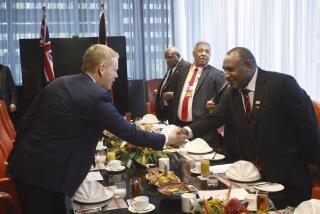U.S.-China Nuclear Pact Flawed but Acceptable, GAO Reports
- Share via
WASHINGTON — The General Accounting Office says the U.S.-China nuclear agreement contains “vague and unclear language” that could lead to misunderstandings with the Chinese over the use of American-supplied atomic materials.
But it says the problems are not serious enough to warrant rejecting the accord, which provides the framework for future sales of nuclear reactors and other nuclear equipment to the Chinese.
The report by the congressional watchdog agency was prepared for Sen. John Glenn (D-Ohio), who unsuccessfully sought to write major revisions into the agreement. The report was dated Nov. 27 but made public only over the weekend.
Safeguards Sought
The agreement, first initialed during President Reagan’s trip to China in 1984, took effect Dec. 11.
Glenn contends that it does not contain explicit safeguards to prevent China from using U.S. materials for nuclear weapons or supplying the material to other nations for weapons development. The Reagan Administration contends that the safeguards are adequate.
The GAO report generally supported the senator’s reservations, although it said that overall “we found nothing in the agreement which would preclude congressional approval.”
The agency said it was unable to explore “the continuing allegations” that China has exported nuclear weapons technology to other countries because “the CIA denied our request for relevant intelligence information.”
It noted that before 1984, the Chinese “espoused the right of every nation to develop nuclear capabilities in order to break the superpowers’ ‘monopoly’ of nuclear weapons.”
‘Vague and Unclear’
Of the agreement itself, the report said it “does contain certain vague and unclear language which could lead to misinterpretation” and that in several instances, the language differs from nuclear cooperation agreements worked out with other nations.
Among the departures, it said, is a lack of specific rules under which U.S. consent would be obtained for any subsequent use of nuclear material, such as reprocessing of spent nuclear fuels into weapons-grade plutonium.
Glenn failed two weeks ago to amend the agreement to require that all nuclear technology sold to China meet the same non-proliferation standards applied to other nations.
The Senate accepted the change, but it was dropped by a House-Senate conference committee after the Administration said that such a restriction would scuttle the accord.
More to Read
Sign up for Essential California
The most important California stories and recommendations in your inbox every morning.
You may occasionally receive promotional content from the Los Angeles Times.













